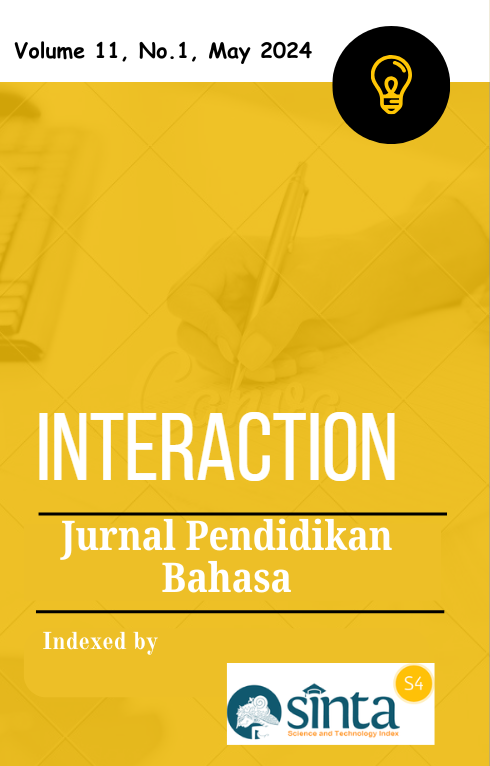The Effectiveness of Problem Based Learning Model to Improve Students' English Learning Outcomes at Ban Klongrua School, Thailand
Abstract
This research aims to determine the effectiveness of the Problem Based Learning model on English learning outcomes for Class IV Ban Khlongrua School Krabi, Southern Thailand. This type of research is pre-experimental research in the form of one group pretest posttest, namely an experiment. The experimental research unit was fourth grade students at Ban Khlongrua School Krabi, Southern Thailand. The results of descriptive statistical analysis of English learning outcomes using the Problem Based Learning Model show better results than before using the Problem Based Learning Model. The results of inferential statistical analysis using the t-test formula show that the calculated t value obtained is 2.79 with a frequency of dk = 10-1 = 9. At the 5% significance level, the t table value = 0.45. So, ct-ount > ttable or 2.79 > 0.45. This proves that the application of the Problem Based Learning model in English learning has an influence so that it can be said to be more effective than before the use of the Problem Based Learning Learning Model.
Downloads
References
Altabany, T. 2015. Designing innovative, progressive and contextual learning models. Jakarta : PT Kharisma Putra Utama
Arikunto Suharsimi. 2013. Research Procedures, a Practice Approach. Jakarta : Rineka Cipta, cet. 15th.
Ati, TP, & Setiawan, Y. (2020). THE EFFECTIVENESS OF PROBLEM BASED LEARNING-PROBLEM SOLVING ON CRITICAL THINKING ABILITY IN MATHEMATICS LEARNING CLASS V STUDENTS . 04 (01), 294–303.
Fathurrohman, M. 2020. Innovative Learning Models. Depok : AR-RUZZ MEDIA.
Fuadi, A., Rahmah, Paulina, & Supriyanto. 2021. Introduction to Educational Science. Bengkalis-Riau: Dotplus Publisher.
Patty, G., Wardani, R., & Nurteteng, N. (2023). The Implementation Of Information Gap Activity and Jumbled Sentence Game In Teaching Reading Comprehension. Akrab Juara : Jurnal Ilmu-Ilmu Sosial, 8(4), 68-78. doi:10.58487/akrabjuara.v8i4.2186
Indrawati, I. 2015. Differences in Teacher Performance. Yogyakarta: Yogyakarta State University.
Kurniawan, D. 2014. Thematic Integrated Learning (Theory, Practice and Assessment). Bandung: Alphabeta.
Meilasari, S., Damris M, DM, & Yelianti, U. (2020). Study of Problem Based Learning (PBL) Learning Models in School Learning. BIOEDUSAINS:Journal of Biology and Science Education , 3 (2), 195–207. https://doi.org/10.31539/bioedusains.v3i2.1849
Misbahuddin and Iqbal, H. 2013. Analysis of Research Data with Statistics. Jakarta: PT Bumi Aksara.
Mulyasa. 2015. Implementation of Unit Level Curriculum for Teacher and Principal Independence Education. Jakarta : PT Bumi Aksara.
Mulyasa. 2015. Implementation of the Education Unit Level Curriculum. Jakarta : PT Bumi Aksara.
Nurdyansyah and Fariyatul, F. 2016. Learning Model Innovation. Surabaya: Surabaya State University.
Sardiman. 2012. Teaching and Learning Interaction & Motivation. Jakarta: Rajawali Press. Setyosari, P. 2012. Education and Development Research Methods. Jakarta : Kencana Dua.
Sofyan, H., Wagiran, Komariah, K. & Triwiyono. 2017. Problem Based Learning in the 2013 Curriculum. Yogyakarta: UNY Press.
Sugiyono. 2016. Educational Research Methodology. Bandung: Alphabeta.
Sugiyono. 2017. Quantitative, Qualitative, and R&D Research Methods. Bandung: Alfabeta.
Syofrianisda, S. 2019. Learning and Learning. Yogyakarta: Dua Satria Offset. Susanto, A. 2014. Development of Social Studies Learning in Elementary Schools. Jakarta: Kharisma Putra Utama
Rahmat, E. (2018). Application of the Problem Based Learning (PBL) Learning Model to Improve Student Achievement. Journal of Educational Research , 18 (2), 144–159. https://doi.org/10.17509/jpp.v18i2.12955
Tahrim, T. 2020. Learning Model Innovation. West Java: Edu Publisher.
Thobroni, M. 2016. Learning & Learning Theory and Practice. Yogyakarta: Ar-Ruzz Media
Trianto. 2019. Integrated Learning Model. Jakarta : Earth of Letters.




.png)



22.png)
